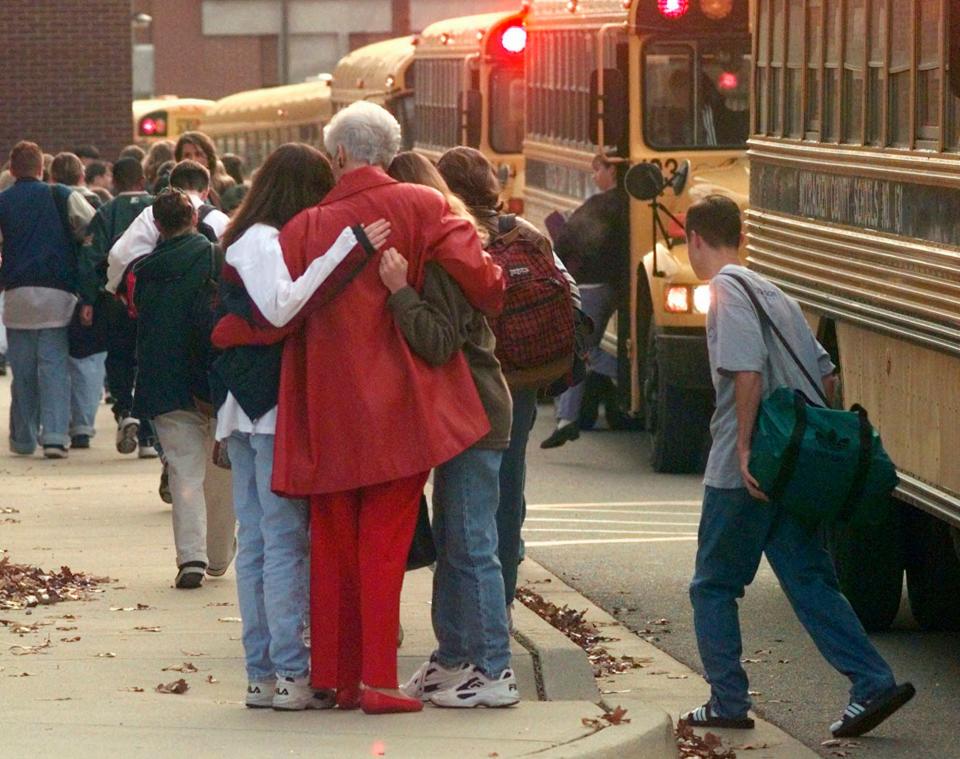Gunman in one of United States' first mass school shootings denied parole in rare hearing
LOUISVILLE, Ky. – The Kentucky Parole Board on Monday ordered Michael Carneal to spend the rest of his life in prison for the shooting massacre at Heath High School in West Paducah in which he killed three fellow students and injured five.
The serve-out ruling means Carneal, 39, will never be considered for parole again.
Given the severity of the crime, it was unlikely Carneal would be freed. But he may have eliminated any chance of that when he testified last week that he still hears voices in his head – like the ones he said told him to open fire on Dec. 1, 1997.
Though he said he can resist those voices now, a parole board member said that his prognosis was poor and that he was experiencing “paranoid thoughts with violent imagery.”
BACKGROUND: As one of the country's first school shooters seeks parole, victim says forgive but don't forget
THE HEARING: Kentucky school shooter testifies in parole hearing
He said on Sept. 20 that he had heard voices two days earlier telling him to jump down a stairway.
Carneal opened fire on a prayer circle gathered before school with a semiautomatic pistol he had stolen from a neighbor’s garage.
It was one the first mass school shootings in the United States, coming 17 months before Eric Harris and Dylan Klebold killed 12 students and one teacher and injured 21 at Columbine High School in Colorado.

Carneal pleaded guilty to murder, attempted murder and burglary of the gun and was sentenced to life. But because he was only 14 at the time, he was entitled to parole consideration after 25 years.
He was believed to be one of the first school shooters to come up for parole; the rest died in their attacks or were condemned to life.
His father, John Carneal, had pleaded for his release, citing his age at the time of the crime. And he and his wife offered to take him into their home and ensure he continued to get mental heath treatment.
He was diagnosed with paranoid schizophrenia and takes three medications for it, he testified.
But his victims and their families testified that there is no guarantee he would continue to take the medications after he was released. All but one testified against paroling him.
RUN, FIGHT, HIDE: School shooter drills can be traumatic, but do they work?
Asked if he deserved parole, Carneal said: “I don’t know: Sometimes I think I deserve to be killed.” But he said he would “like to do something good for society."
He killed three fellow students – Kayce Steger, 15, Nicole Hadley, 14, and Jessica James, 17, and injured Missy Jenkins Smith, who was paralyzed from the chest down; Hollan Holm, Shelly Schaberg, Kelly Hard Alsip and Craig Keene.
Jenkins Smith, who visited Carneal in prison, said that she had forgiven Carneal but that “he is doing well behind bars and he should stay there."
“Why mess with something that isn’t broken?” she said in an interview.
Nicole Hadley’s mother, Gwen, told the board that “Nicole didn’t get a second chance. The shooter should stay where he is.”
Andrew Hadley, her younger brother, said he has suffered from anxiety and depression since she was gunned down and struggles to come up with an answer when his own daughter, 5, asks when she is going to meet her Aunt Nicole.
Follow Andrew Wolfson on Twitter: @adwolfson.
This article originally appeared on Louisville Courier Journal: Kentucky school gunman Michael Carneal denied parole

 money
money 